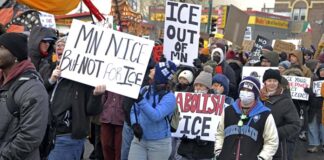The fatal stabbing of Punjab-born student Nitin Garg in Melbourne in early January has provoked another round of distortions and denials from Kevin Rudd and the Victorian Police. Last year in May, when protest and anger exploded onto the streets of Sydney and Melbourne against the racist attacks, Victorian police initially denied racism was a factor. Victoria’s Deputy Police Commissioner even blamed Indian students themselves, saying they were “being attacked because they were by nature quiet and passive people, they travelled late at night, often alone and carried expensive gadgets.”
But in January Victorian Police Commissioner Simon Overland admitted that police had realised two years ago, long before it hit the headlines, that a problem of racist violence against Indians existed. The Federation of Indian students commented that the Commissioner’s statement “marks the end of denial.”
An Indian newspaper, the Delhi Mail, depicted the duplicitous and racist response of the police in a cartoon with one of the state’s officers as a member of the Ku Klux Klan.
Then in early February the Victorian Police Commissioner showed that police have learnt nothing, telling a meeting of international students that Indian students shouldn’t work as taxi drivers and should “look as poor as you can” to avoid being attacked.
Kevin Rudd has tried contain the anger and appealed for responses to be kept in “context”—denying that the attacks on Indians are distinguishable from other attacks on ethnic and Australian students. But many of the attacks have been explicitly racist, and it’s obvious that Indians in Australia are vulnerable to violence in exploitative workplaces and universities.
The response to Nitin’s murder has not seen the same level of fury and defiance we witnessed last year. Pressure has come from the Indian government and some community leaders to avoid rallies or protests. They claim that such a response will only invite further attacks and fan the flames of this racism. But it was only the political protests that forced the police and government to acknowledge the scale and racist nature of the attacks. Protests brought the highly exploitative conditions of Indian students into the public eye and sent a very clear public message—that racism will not be tolerated and that Indians will fight back.
By Emma Torzillo and Jasmine Ali





